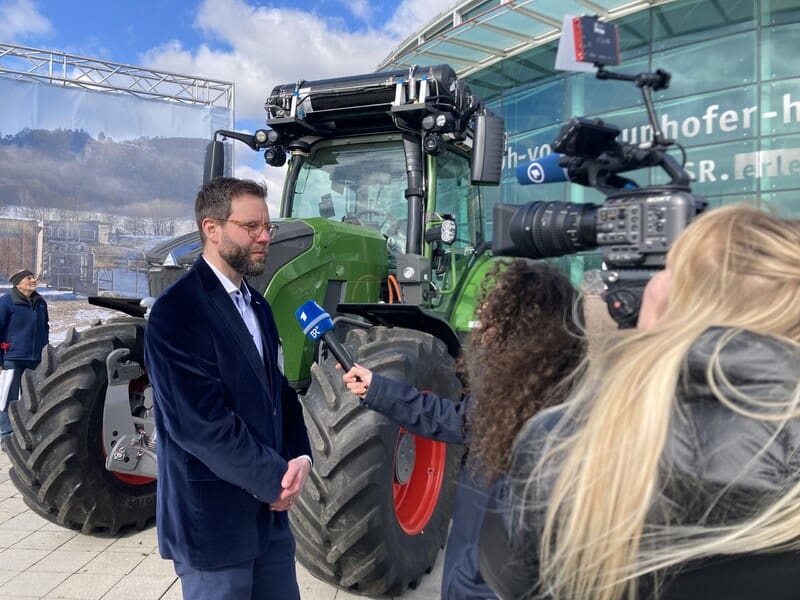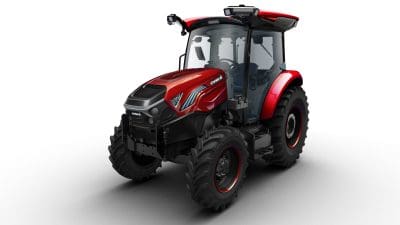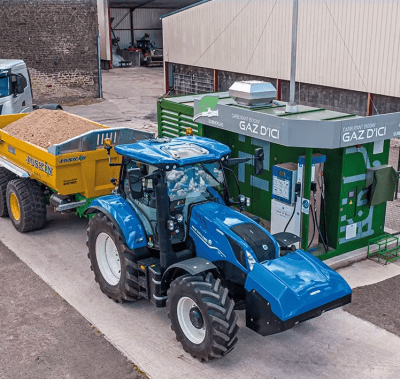
Fendt unveiled its prototype hydrogen tractor at the hydrogen summit in Bavaria, Germany last year. Photo: Fendt
AUSTRALIAN preview and release dates are appearing on the horizon for tractors powered by electric motors, but leading manufacturers are yet to share any details on when machinery driven by alternative fuels will appear in the larger segment.
Case IH is due to showcase its electric tractor at an Australian field day for the first time this year, while John Deere plans to launch an autonomous battery-powered electric tractor in Australia in 2026.
Germany’s AGCO Power is an established manufacturer of diesel engines for Fendt, Massey Ferguson, and Valtra, and is already building an engine that can be powered by hydrogen, biogas and ethanol.
Also in Europe, New Holland is making a tractor which can run on a combination of hydrogen and diesel, but it appears unlikely to appear any time soon in Australia, where questions exist over what alternative fuel will be widely available to agriculture at scale, and at an affordable price.
While electric tractors are poised to take some market share in the smaller segment, diesel-powered machinery for broadacre cropping looks like it will keep rolling for some years.
Electric gets moving
The Australian public will get its first look at the Case IH battery electric tractor in August following its reveal in North America last year at Farm Progress Show in Decatur, Illinois.
“In 2023 we launched a 75hp battery electric tractor at Farm Progress in USA, with plans to showcase this unit at the AgQuip field days in NSW in August 2024,” Case IH Australia-New Zealand product manager for mid-horsepower & compact tractors Seamus McCarthy said.

Case IH is taking its 75hp electric tractor to AgQuip 2024. Image: Case IH
“We will also expand the electric tractor range into lower hp models through 2025-26,” he said.
“Case IH is commercially committed to the electrification of our product offering, starting with tractors.”
Case IH is yet to make any announcements about hydrogen-powered models, but they could be in the pipeline.
Likewise, John Deere appears focused on electric for the time being.
In 2022, it became the majority owner of Kreisel Electric, a global leader in high-density, high-durability battery modules and packs.
“John Deere is expecting to launch autonomous battery-powered electric tractors in Australia in 2026,” John Deere Australia and New Zealand production system manager Steph Gersekowski said.
“Alongside the tractor, John Deere will also bring electric batteries and chargers to market to facilitate the new technology.”

Markus, Phillipp and Johann Kreisel with John Deere representatives including Pierre Guyot.
John Deere said its customer research has shown up to 70 percent of horticulture farmers indicating they would like to purchase an electric option.
“Delivering autonomous and electrically powered tractors is among the solutions John Deere is providing farmers to harness Australian agriculture’s immense opportunities of meeting increased global food demand.”
New Holland and Kubota also have electric models which are expected to appear in Australia in coming years.
Europe goes for gas
In order to decarbonise its products, AGCO is developing battery electric tractors, and is also producing the new Core range of engines built to be powered by alternative energy sources including hydrogen, biogas and ethanol.
“Through these and other paths, AGCO is embedding sustainability into state-of-the-art machine design to help farms transition to ever-cleaner energy,” AGCO marketing director for Australia and New Zealand Fergal Meehan said.
Core has made its first public appearance in the Gen 7 700 Series, which incorporates five models across the 147-206kW (203-283hp) power range.
“Future-proofing our product to take advantage of new environmentally friendly alternative fuel developments is a major focus of our company.”
AGCO is also working with hydrogen fuel through the H2Agrar agricultural model project in Haren, Germany.
“In our part of the project, we have developed two prototype hydrogen-powered tractors to establish the usability and performance potential of hydrogen for agricultural machinery.”
“The prototype Fendt tractors are equipped with hydrogen fuel cells and will be used under real conditions on two agricultural test farms.”
As shown in the video above, the cab’s roof is fitted with five hydrogen tanks, each carrying 4.2kg at 700 bar pressure.
This pressure is reduced to about 10 bar before the hydrogen goes into the fuel cell to be converted into electricity to provide around 350kW hours, with a battery providing an additional 25kW hours to provide up to 105kW of power for several hours.
Fendt unveiled its prototype hydrogen tractor at a hydrogen summit in Bavaria in February 2023.
On its website, New Holland said it was opting for dual-fuel as a transitional technology needed to stimulate the use of hydrogen as a fuel.
“Given the cost of infrastructure investments, it is important to have a flexible technology that will boost demand for hydrogen and hydrogen refuelling infrastructure but will still work even if no hydrogen is available,” the website said.
New Holland said dual-fuel combustion engines have the same long working lives, low purchase cost and low operating costs as normal combustion engines.
“Only minimal modifications are required to adapt internal combustion engines for dual-fuel operation (in some cases, the technology can even be retrofitted to existing engines) which means that purchase costs are low.”

New Holland’s T6 methane-powered tractor at home in Europe. Photo: New Holland
Its H2 Dual Power model is based on the conventional New Holland 96kW (129hp) T5.140 Auto Command tractor.
Its conversion includes the installation above the cab of five cylinders, each carrying 11.5kg of hydrogen pressurised at 350 bar.
New Holland has since 2021 been selling the T6.180 methane-powered tractor in Europe, which it puts forward as a fit for farms that make their own energy from plant and animal waste to power their operations.
The 110kW (148hp) T6.180 is marketed as having the same power and torque levels as its diesel equivalent, but with 30pc lower operating costs, 98pc less particulate matter, 11pc less CO2 emissions, and 80pc less lower total emissions.
“The T6 Methane is commercially available in the European and North American markets,” New Holland’s New South Wales-based product segment manager Ben Mitchell said.
“It’s currently under consideration for the Australia-New Zealand market, and we are talking to potential partners for this type of machine.”
In the pipeline is New Holland’s T7 tractor, which runs on compressed natural gas, and made its first public appearance at the Agritechnica event in Hanover, Germany in November.
“The T7 LWB CNG is still a few years away, as is the T4 Electric for ANZ.”
Mr Mitchell said New Holland has heavily invested in its alternative fuels strategy, and was continuously investigating further expansion into markets around the globe.
Questions in Australia
The hydrogen-energy sector is under development in Australia, with Western Australia’s Fortescue leading the way.
As a global heavyweight in iron ore production, it is looking to decarbonise its supply chain, which currently relies on fossil-fuel powered transport.
Fortescue is currently working with a number of other stakeholders including Incitec Pivot to evaluate the scope for green hydrogen production in Australia.
Whether what Fortescue and others potentially produce is exported, consumed domestically, or both, is likely to influence the scope and timing of broadacre machinery’s shift away from fossil fuels.
Fortescue major investments in green energy have so far been made in the Americas and Europe.
Through the Australian Renewable Energy Agency, the Federal Government has launched the Hydrogen Headstart Program to invest in renewable hydrogen projects.



HAVE YOUR SAY